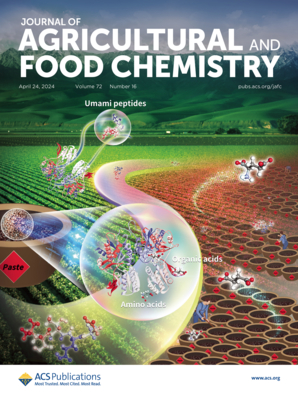Standardized Synergistic Strategy for Insect Growth Regulators: Incorporation of RNA Pesticides via a Co-Delivery Nanoplatform Achieves High Control Efficacy with Low-Dosage Application.
IF 6.2
1区 农林科学
Q1 AGRICULTURE, MULTIDISCIPLINARY
引用次数: 0
Abstract
Insect growth regulators (IGRs) face limitations of slow action and high dosage, while RNA pesticides are constrained by the scarcity of effective RNAi targets. Here, we propose a standardized strategy to develop multicomponent nanopesticides by combining IGRs with RNA pesticides via a co-delivery nanoplatform. The star polycation (SPc) nanocarriers and diflubenzuron (DFB) were assembled into nanoscale DFB/SPc complexes, enhancing toxicity against green peach aphids by disrupting chitin biosynthesis. RNA-seq analysis identified chitin synthase (CHS) as a synergistic RNAi target. The hpCHS/SPc complex effectively silenced CHS, inducing more than 50% aphid mortality. Co-loading dsCHS and DFB produced stable nanoparticles with improved leaf adhesion, plant uptake, aphid cuticle contact, and translocation, achieving up to 82.2% mortality at only LC20 of free DFB. This work establishes a generalizable, scalable approach for designing multicomponent nanopesticides with high efficacy and low dosage for sustainable pest control.昆虫生长调节剂的标准化协同策略:通过共递送纳米平台加入RNA农药实现低剂量高控制效果。
昆虫生长调节剂(IGRs)面临着作用缓慢、剂量大的限制,而RNA农药则受到有效RNAi靶点缺乏的限制。在这里,我们提出了一种标准化的策略,通过共递送纳米平台将IGRs与RNA农药结合起来,开发多组分纳米农药。将星形多阳离子(SPc)纳米载体与二氟苯脲(DFB)组装成纳米级DFB/SPc复合物,通过破坏几丁质生物合成增强对青桃蚜虫的毒性。RNA-seq分析发现几丁质合成酶(CHS)是一个协同的RNAi靶点。hpCHS/SPc复合物有效地沉默了CHS,诱导蚜虫死亡率超过50%。共载dsCHS和DFB产生了稳定的纳米颗粒,改善了叶片粘附、植物吸收、蚜虫角质层接触和易位,仅在LC20的游离DFB下,死亡率高达82.2%。本研究为设计高效、低剂量、可持续防治害虫的多组分纳米农药建立了一种可推广、可扩展的方法。
本文章由计算机程序翻译,如有差异,请以英文原文为准。
求助全文
约1分钟内获得全文
求助全文
来源期刊
CiteScore
9.90
自引率
8.20%
发文量
1375
审稿时长
2.3 months
期刊介绍:
The Journal of Agricultural and Food Chemistry publishes high-quality, cutting edge original research representing complete studies and research advances dealing with the chemistry and biochemistry of agriculture and food. The Journal also encourages papers with chemistry and/or biochemistry as a major component combined with biological/sensory/nutritional/toxicological evaluation related to agriculture and/or food.

 求助内容:
求助内容: 应助结果提醒方式:
应助结果提醒方式:


